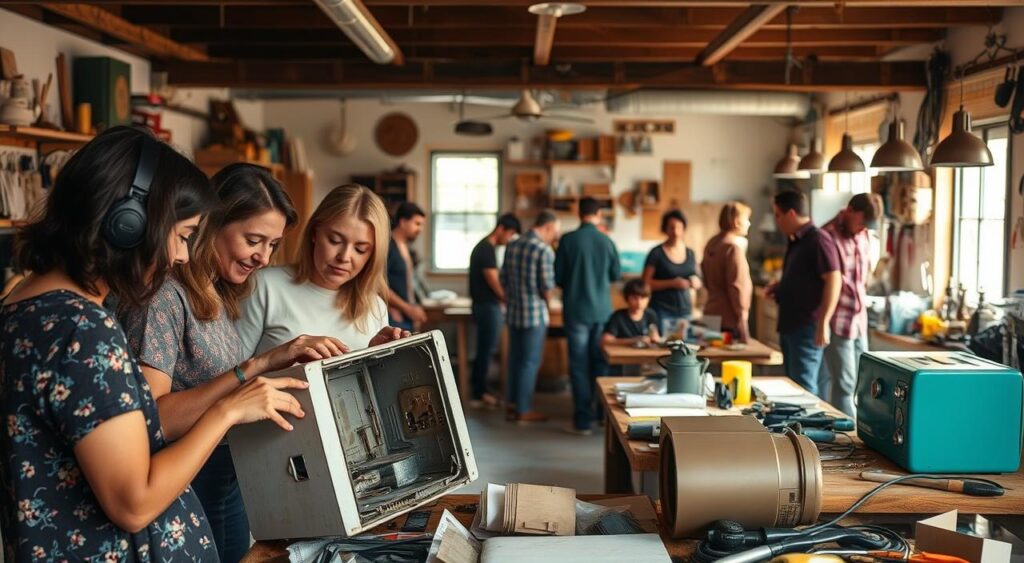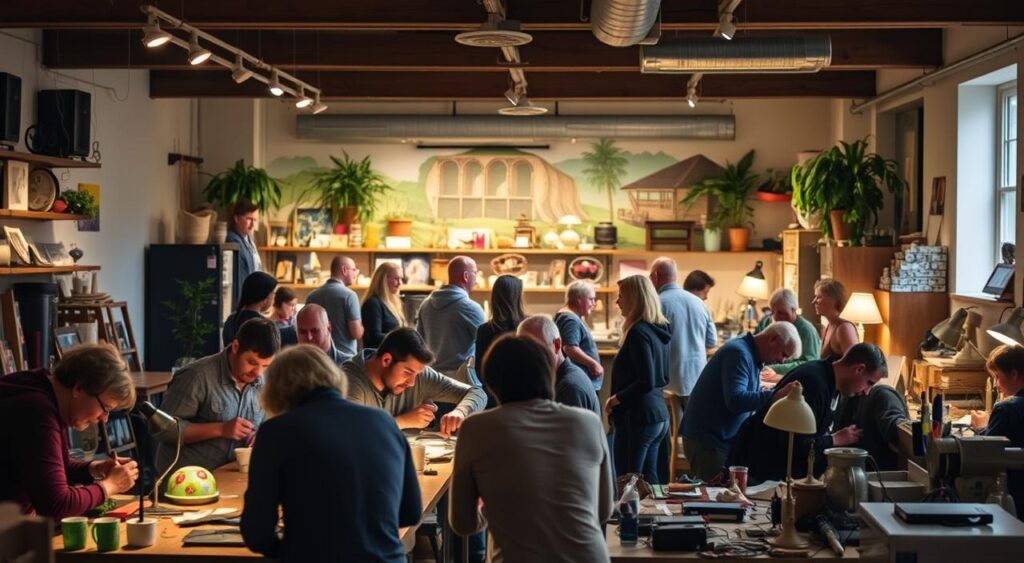In London, a transformative movement is reshaping how communities approach consumption and waste. At the forefront are swap shops and repair cafes, vibrant spaces where people gather to fix broken items, exchange goods, and build stronger community ties. These initiatives challenge the throwaway culture, promoting sustainability while fostering meaningful connections among residents. By extending the life of everyday items, Londoners are reducing waste, saving money, and embracing a more eco-conscious lifestyle.

This article explores the rise of repair cafes and swap shops in London, their environmental and social benefits, and how you can get involved. From reducing carbon emissions to learning new skills, these community-driven efforts are paving the way for a more sustainable future.
Key Takeaways
- Repair cafes and swap shops are redefining consumption in London by promoting repair and reuse.
- These initiatives reduce waste, lower carbon footprints, and encourage sustainable living.
- They create opportunities for skill-sharing, cost-saving, and community bonding.
- London hosts a growing network of repair cafes and swap shops across various boroughs.
- Getting involved as a visitor or volunteer is easy and impactful, with resources available to start your own initiative.
The Rise of Repair Cafes and Swap Shops in London
Across the UK, community-led initiatives like repair cafes and swap shops are gaining momentum as alternatives to disposable culture. In London, these hubs are not only reducing waste but also fostering a sense of belonging among participants. By encouraging repair and exchange, these spaces help residents adopt sustainable practices while building stronger communities.
What Are Repair Cafes?
Repair cafes are community-driven spaces where volunteers help fix broken items, from electronics to furniture. These events provide a platform for skill-sharing, waste reduction, and social interaction. Volunteers with diverse expertise—such as electronics repair, sewing, or carpentry—work together to restore items, keeping them out of landfills. Repair cafes typically operate monthly, offering free repairs in exchange for optional donations to sustain the initiative.
For more on sustainable living, check out our blog post on Eco-Friendly Practices for Urban Dwellers to learn how small changes can make a big impact.
The Growing Movement of Swap Shops
Swap shops complement repair cafes by enabling people to exchange items they no longer need for ones they want. From clothing to household goods, these platforms promote sustainable consumption by reducing the demand for new products. Swap shops often operate alongside repair cafes, creating a holistic approach to reuse and recycling. Many London boroughs host regular swap events, making it easy for residents to participate.
To explore more ways to reduce waste, visit our guide on Sustainable Shopping Tips for practical advice.
How Repair Cafes and Swap Shops Operate
Both repair cafes and swap shops rely on community participation and volunteer efforts. Here’s how they typically work:
- Repair Cafes: Held monthly, these events involve registering items for repair, assessing their condition, and fixing them with volunteer expertise. Common repairs include electronics, clothing, and furniture. Donations help cover costs like tools and venue fees.
- Swap Shops: These events allow participants to bring unwanted items and trade them for others. Organizers ensure fair exchanges, and some shops specialize in specific goods like books or children’s toys.
| Initiative | Frequency | Key Activities |
|---|---|---|
| Repair Cafes | Monthly | Repairing electronics, furniture, clothing, etc. |
| Swap Shops | Regularly | Exchanging goods, promoting sustainable consumption |
These initiatives create spaces where Londoners can share resources, learn skills, and contribute to a circular economy. For more on circular economy principles, read our post on The Circular Economy Explained.
Environmental and Social Impact of Repair Cafes and Swap Shops

The growing popularity of repair cafes and swap shops in London reflects their dual impact on the environment and community well-being. These initiatives address both ecological concerns and social needs, making them a cornerstone of sustainable urban living.
Reducing Waste and Carbon Emissions
By repairing items instead of discarding them, repair cafes significantly reduce landfill waste. The UK generates millions of tons of waste annually, much of it from discarded goods that could be repaired or reused. Extending the life of products also lowers the demand for new items, which reduces the carbon emissions associated with manufacturing and transportation.
According to environmental research, repairing and reusing goods can cut carbon footprints by up to 20% for certain product categories. Swap shops further amplify this impact by keeping usable items in circulation. For more insights, visit The Guardian’s guide to reducing waste.
| Impact Area | Description | Benefit |
|---|---|---|
| Waste Reduction | Repairing and reusing items | Less landfill waste |
| Carbon Emissions | Lower demand for new products | Reduced environmental footprint |
| Community Building | Skill-sharing and collaboration | Stronger social bonds |
Building Skills and Saving Money
Repair cafes offer hands-on learning opportunities, allowing participants to acquire skills like basic electronics repair or sewing. These skills empower individuals to maintain their belongings, reducing the need for costly replacements. For example, fixing a broken appliance can save hundreds of pounds compared to buying a new one.
To learn more about skill-building for sustainability, check out our article on DIY Home Repairs for Beginners.
Fostering Community Connections
Beyond environmental benefits, repair cafes and swap shops create spaces for social interaction. Volunteers and visitors collaborate, share stories, and build relationships, fostering a sense of belonging. As one volunteer shared, “These events feel like therapy. They bring light to the community and connect people in meaningful ways.” This social impact is especially valuable in urban settings like London, where isolation can be a challenge.
For more on community-building initiatives, explore Community Matters for resources on local engagement.
London’s Top Repair Cafes and Swap Shops
London’s network of repair cafes and swap shops is thriving, offering residents numerous opportunities to engage in sustainable practices. Here are some standout examples:
Nunhead Repair Cafe
Located at St. Antony’s Church, Nunhead Repair Cafe is a community favorite. Volunteers offer free repairs for items like gadgets, clothing, and furniture, creating a welcoming environment for all. The cafe operates monthly and encourages donations to sustain its efforts.
Other Notable Repair Cafes
- Hackney Repair Cafe: Known for its focus on electronics and small appliances, this cafe attracts tech-savvy volunteers and eco-conscious residents.
- Ealing Repair Cafe: A hub for furniture and textile repairs, Ealing’s cafe emphasizes skill-sharing and community engagement.
These cafes serve as vital community hubs, reducing waste while fostering collaboration. To find a repair cafe near you, visit Repair Café UK.
Finding Swap Shops in London
Swap shops are increasingly popular across London boroughs. From clothing swaps in Camden to toy exchanges in Islington, these events offer affordable, sustainable alternatives to buying new. Check platforms like Eventbrite or local social media groups to find swap shop events in your area. Many boroughs also host seasonal swap markets, so stay updated through community boards.
Getting Involved: From Visitor to Volunteer
Joining the repair cafes and swap shops movement is easy and rewarding. Whether you’re a visitor with a broken item or a volunteer eager to contribute, there’s a role for everyone.
Starting as a Visitor
Begin by attending a local repair cafe or swap shop. Bring items that need fixing or goods to exchange, and experience the community spirit firsthand. Most events are free, with optional donations to support operations.
Becoming a Volunteer
Volunteering is a great way to deepen your involvement. Repair cafes welcome diverse skills, from technical repairs to event organization. No expertise? No problem—many cafes offer training to help you get started. Swap shops also need volunteers to manage exchanges and promote events.
Starting Your Own Initiative
Interested in launching a repair cafe or swap shop? Organizations like Cambridge Carbon Footprint provide resources, including training, tool libraries, and funding opportunities. The Repair Cafés Support Fund is accepting applications for 2025 until June 30. Contact them for details on starting your project.
Opportunities for Businesses and Schools
Businesses and schools can support the movement by hosting events or partnering with local cafes. These collaborations reduce environmental impact while enhancing community engagement. For partnership ideas, check out our post on Sustainable Business Practices.
Conclusion
Repair cafes and swap shops are more than just places to fix or exchange goods—they’re catalysts for change in London’s communities. By reducing waste, lowering carbon emissions, and fostering social connections, these initiatives are building a more sustainable and inclusive future. Whether you’re repairing a beloved item, swapping for something new, or volunteering your skills, your participation makes a difference.
Take the first step by visiting a local repair cafe or swap shop. Explore the resources mentioned, such as Repair Café UK and Cambridge Carbon Footprint, to get involved. Together, we can transform London, one repair and swap at a time.